Ambulance 's Michael Bay: 'I feel the American dream has been twisted and is disappearing'
- Oops!Something went wrong.Please try again later.
- Oops!Something went wrong.Please try again later.
Even at his own press junket, a low-pressure affair where Michael Bay only has to answer questions and pose for cameras, he's adjusting the lighting. The blue glint on the ambulance parked behind him is wrong. Gaffers flock to his side, nodding and making adjustments. Everyone else in the room — journalists, publicists, A-list actors — will have to wait.
Bay, 57 and youthful in a leather jacket and tee, will always be preceded by his reputation: demanding, a technical wizard prone to a fast pace and the occasional detonation, onscreen and off. His method has resulted in some of the most iconic action movies of the last quarter century, The Rock (1996), Armageddon (1998), and five Transformers beginning in 2007.
The director's latest, Ambulance, is an unlikely product of the pandemic, but an ingenious one: a deliriously fast chase movie shot in a half-empty Los Angeles, where significantly less traffic turned the city into an ideal set (also an inexpensive one). Bay took the opportunity to make his most unhinged movie to date, a Big '90s Energy throwback starring Jake Gyllenhaal in a performance that's best described as a one-man Face/Off.
Bay knows that, to some people, he's a punchline. He doesn't care. Critically, the tide may be turning toward his elephantine, instantly identifiable sense of style and sentiment (he's an auteur that even your parents know), but again, he doesn't care.
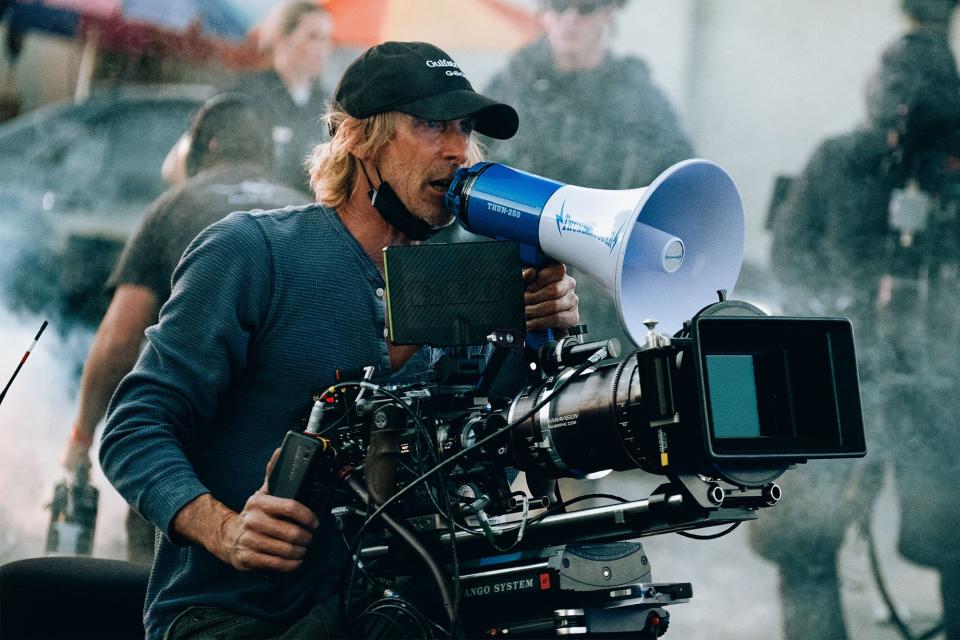
Andrew Cooper/Universal Pictures Director Michael Bay on the set of 'Ambulance'
ENTERTAINMENT WEEKLY: Before we talk about Ambulance, let's touch on Bruce Willis. What was it like working with him? And what do you think of his family's recent announcement that he'd be retiring due to a diagnosis of aphasia?
MICHAEL BAY: Listen, I've worked with Sean Connery, and he was very tough on directors. I was so scared to say my very first line of direction to him when he was in the interrogation room in The Rock. He was wearing a long gray wig. First take, second take, I go — I'm scared out my mind to say this, by the way, because he's done 75 movies, longer than I've been alive — and I'm like, "Sean, can you say that less charmingly?" And he goes, "Sure, boy, sure." So he called me "boy." But he weirdly took me under his wing. He was a very tough-love guy, but I could tell he really liked me. He would never show it. But he taught me a lot.
Did working with Willis remind you of that?
Bruce was tough at the beginning of Armageddon, and there was a point when [producer] Jerry Bruckheimer said to me, "You've got to show him some scenes." So I did. And Bruce goes, "Wow, you should have shown that to me earlier." And ever since then, we got along. But you've got to understand, from an actor's point of view, you're putting yourself out there, and it's a very scary thing when you don't think that the director might have your back. Does that make sense?
It does, and those questions of trust and control figure in Willis's situation especially.
I loved working with him. I thought he was a stunt mogul, but apparently that wasn't his thing. I'm like, "What? I saw Die Hard. He was amazing in Die Hard." Apparently, it was a stunt man. I love Bruce because he was funny — he would do improv. There are certain people that are movie stars. He was one of them.
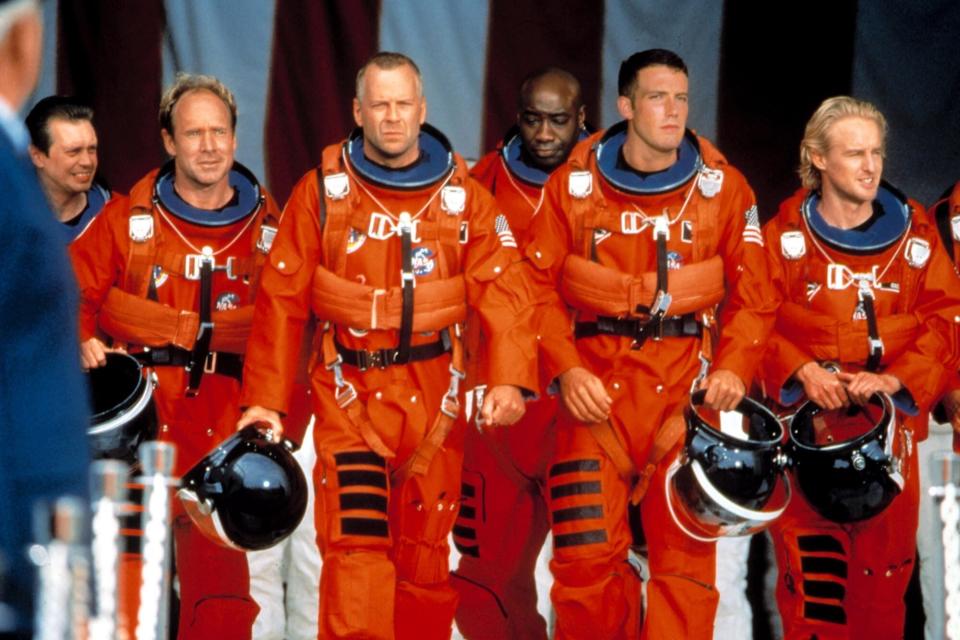
Everett Collection Steve Buscemi, Will Patton, Bruce Willis, Michael Clarke Duncan, Ben Affleck, and Owen Wilson in 'Armageddon'
When I think about Armageddon, I think of it as a perfect American action movie: big, blustery, a pageant to American knowhow. Anyway, it's very American. Would you call yourself a patriotic person?
It's interesting because a lot of European press have started to look at my movies, and they say, "You're a very patriotic director. And do you feel that the American dream in is disappearing?" And I'm, like, "That's a very astute observation. And yes, I do." I feel the American dream has been twisted and is disappearing, and that's how I feel.
Your movies can be read as statements on America's military might. You have a thing, obviously, for vehicles and machines, but a lot of that hardware is military, and you work with the military on your shoots. Your films are comments on American strength. How intentional is that?
The first time I worked with the military was The Rock. I was the very first director to have real United States SEALs in a movie. As Bruckheimer always told me, "It's where you get the great stuff, [getting] real people to do what they actually do." Our movie was not cleared through the Pentagon, but when the SEALs came to the set, I said, "All right, pretend you guys are going into the Rock, you're going underwater. How would you do it?" And they explained, "This is how we would do the incursion." They came back with stripes on their face and I'm like, Okay, that is badass. And I asked them, "And now you pop up through the cistern room — how would you do it?" So three guys with stripes pop up, three guns pointed in different directions, as silent as you can be. I'm like, "Okay, we're shooting that."
So it's a matter of authenticity?
I'll tell you the reason why I do it. When you start meeting these people that believe in their country, that put their life on the line, and you get to know them, it's a fascinating thing. And I've been so admiring of people that would do that. When I grew up, I kept asking my mom, "Mom, will I have to go to Vietnam?" It was always a very scary thing for me, being a little kid and seeing the body count. I think they had the body count on the news, and they showed war footage. It was always very scary.
But you came through that experience with a deep love of country.
When you start working around people at the Pentagon, people that go into hostile territories and rescue Americans, or when you go to NASA, you are awestruck. There's nothing like it in the world. It's the land of the big toys. I think we were all crying on Armageddon when they literally shut down prepping the Shuttle for one hour so we could go on the gantry, a loaded Shuttle right there. And it's like: This is just awesome that we could do this. Because it's just the brain power and the total American can-do spirit. And I think we've lost that can-do spirit.
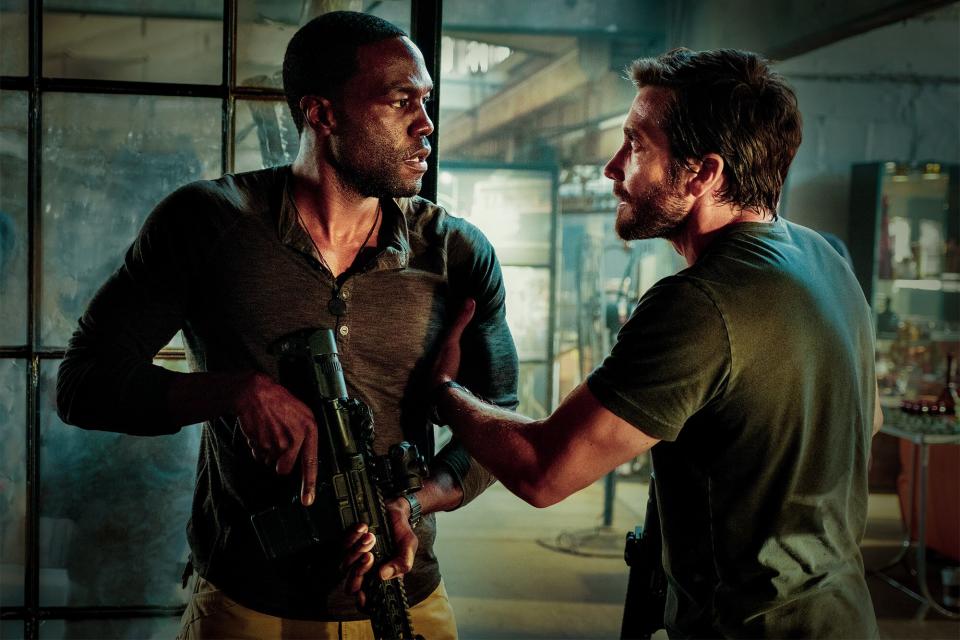
Andrew Cooper/Universal Pictures Yahya Abdul-Mateen II and Jake Gyllenhaal in 'Ambulance'
Let's talk about Ambulance, because that film celebrates a first responder, a Los Angeles paramedic played by Eiza González. It also lets us ride along with two bank robbers, another distinctly American obsession, especially in movies. I feel your signature in it: the slo-mo flags and the dappled sunlight and the grandeur. Where does your visual style come from?
Well, there's only one flag in this movie. He leaves the house and you see the flag. And you never see it again. Oh, actually, wait, there's one more flag. You're right. I made a mistake, okay?
I like the flags. I'm just very curious about what inspires you, visually.
Well, there are a lot of people that inspired me. When I saw Star Wars, I was awestruck. When I was fifteen-and-a-half, I worked at Lucasfilm filing Star Wars photos and spaceship drawings, Yoda's bog house, and I saw how the magic was created. I filed Raiders of the Lost Ark storyboards. They were big, beautiful, like a cartoon. I'm looking at them and saying, "Steven's doing this movie called Raiders of the Lost Ark, and it's going to suck." Cut to a year later, I see it in Grauman's Chinese Theatre with my parents. We would go most Sundays to movies. And I'm like, Oh my God, this movie is awesome. This is what I want to do.
So you weren't quite sure at first, but the film persuaded you.
Movies can be huge memories for kids growing up. They're markers in life. And then the Coen brothers — it was about their style and they're funny — and then Scorsese, Kubrick. But as a 13-year-old, I was very into photography, and I thought I sucked at it. And then all of a sudden I started winning awards and I thought, okay, maybe I'll be a professional photographer. And I went to Wesleyan, back east in Connecticut, and I don't think I was so accepted. It was very theoretical. But I had an amazing teacher, Jeanine Basinger.
I was going to ask you about her, because she's a legendary film scholar. Not a lot of people know this about you.
Her knowledge of film, it's unmatched, from musicals to Westerns to comedies. And to hear her talk, she's like a normal grandmother. But she is inspirational. And what I meant by not "accepted," I was in a fraternity. I played baseball, I was sitting next to Joss Whedon or Toby Emmerich, they were classmates. And I was a little late to the program, but Jeanine sort of latched on to me and she liked my interpretation of films. And she saw my visual acuity when I wanted to analyze them. My senior thesis — I know I ramble a lot, so you'll have to edit all this crap.
I'm not going to stop you.
I remember going for my senior thesis, and a friend and I wrote the script. It was called My Brother Benjamin. I gave it to this guy, John, I forget his last name. He was sort of an a--hole professor. And he goes, "I'm not going to let you make your senior thesis, I don't like it." I walked down the hall in the arts building at Wesleyan and I'm depressed. I see Jeanine, she's got her granny glasses on, and she goes, "What is it? Sit down." I say, "John's not going to let me make my movie, so I think I'm going to just be a photographer." And she takes her glasses off — this is a true quote — and she goes, "You go back in that room right now and you tell him you're making your fucking movie." Life-changing event.
I think I just saw that scene play out in my head like a Michael Bay film, with a circling camera, just like Bad Boys.
You have those moments in life where it can change your life.
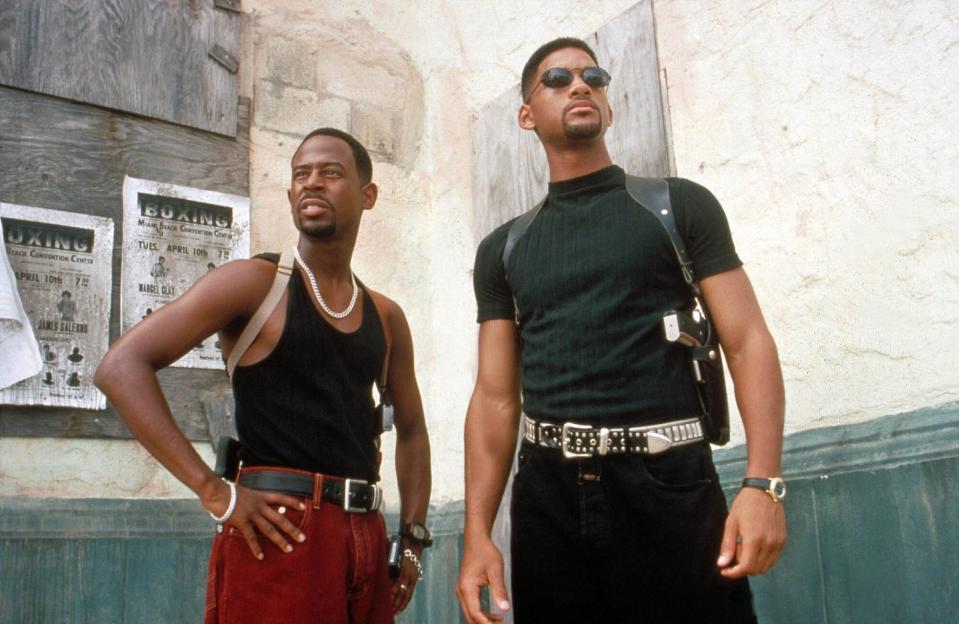
Moviestore/REX/Shutterstock Martin Lawrence and Will Smith in 'Bad Boys'
Meanwhile, what is it about that camera move, circling the characters? It's a signature of yours. You even use it in Ambulance for a scene that seems to last two minutes.
It gives a weird tension. I'll tell you how that shot came up in Bad Boys. Sony didn't believe in the movie, because two Black actors don't sell overseas. They had no faith in it. I was watching James Cameron's True Lies and I'm like, Oh, my God, this guy has so much money. I have only $9 million. And they shut me down, literally. They shut the power off. That's how rude they were on this movie. Luckily I had 500 days of film set experience doing videos, commercials, working with some of the most famous athletes in the world, and that's where you really truly know how to deal with a--holes.
Where does the circle shot come in?
So I remember we're driving our van. The line producer, he didn't like me. I don't think he liked anybody. I said, "Stop the car! Stop the van." And he's coming up to me, the line producer, saying, "What are you doing, Michael? We don't have time for this." I'm like, "This is going to be the trailer shot." For some reason, I just came up with this shot as we're driving. And I said, "Where's the circle trolley? Get the circle trolley." And we made this round move and you guys rise up and it became a very famous shot. People try to imitate it, but it was a seminal moment. Bad Boys literally changed the game on Black actors. It's the first movie that really traveled overseas.
Ambulance feels like a Michael Bay movie, but times ten. Manic would be understating it. Where does this newfound drive come from? Were you bored during the pandemic?
I said to my agent, "God, I just want to do something. I just need to be around people." Because I love to shoot. And I'm a director who doesn't have a trailer, doesn't have a director's chair. I don't have a video village. And for people that don't understand what that is, the director sits on their chair far away and they drink their coffee and lattes and they're talking through a microphone to the actors. I am not that guy. I am the guy that takes blood with a little brush, I splatter it on Eiza, I'm there holding a camera, I'm right in front of their faces. I'm there on the set the whole time. And I create this energy. And there's a word that was created, not by me, but by crew members, called "Bayhem."
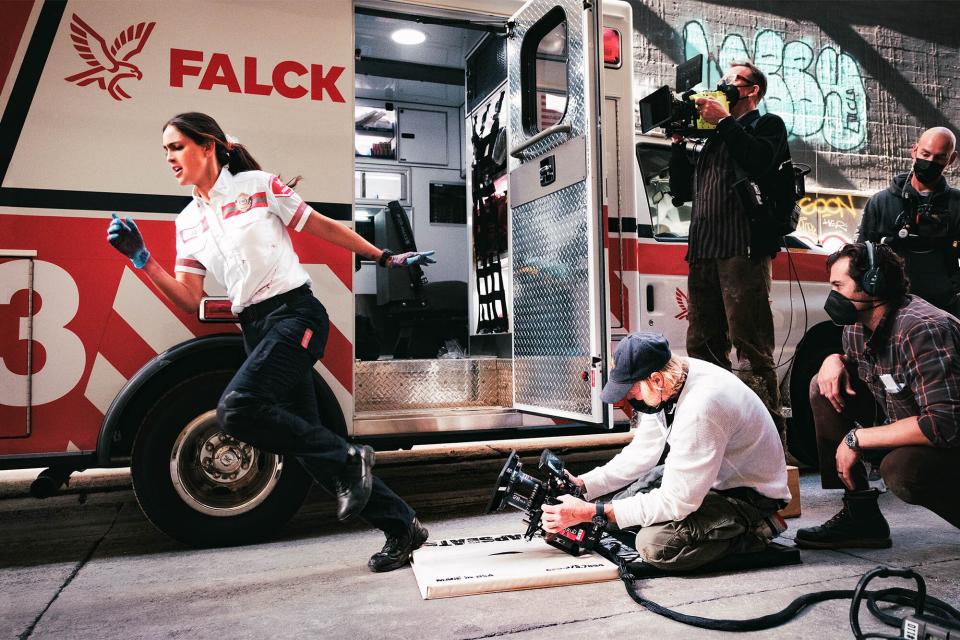
Andrew Cooper/Universal Pictures Eiza Gonzalez and Michael Bay on the set of 'Ambulance'
How do you feel about that term?
I think it's good because there's a reason why I do it. I shoot very fast. I'm a very fast shot-maker. I know my movie very well before I'm even there. It's in my head. I don't even have a script supervisor.
What do you love about explosions, and why do you put them in every film?
Well, for one, I know how to do them very, very well.
Do you get upset when critics call you the guy who just likes explosions?
Here's the thing, I don't read the critics. Don't tell me anything about critics because I don't read them. Bruckheimer always told me, "Don't read the good, don't read the bad." I make movies for audiences. And to each their own. You could like a book, you could not like a book. So I'm fine with it. Box office speaks for itself. So there's plenty of loyal fans. And I'm comfortable. You could either like it or not.
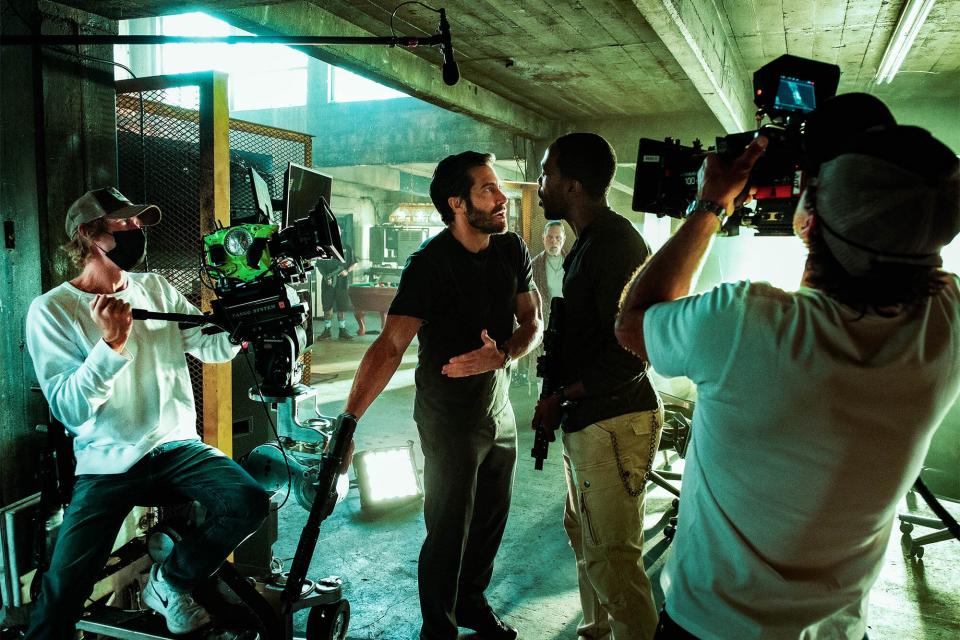
Andrew Cooper/Universal Pictures The set of 'Ambulance'
Ambulance actually feels more character-driven and concentrated than the term Bayhem would suggest. There are explosions, sure, but it's more about forward momentum.
I wanted to give it that very immediate feel. Because I think we all fantasize about robbing banks. I think everyone's had that fantasy. But what would it feel like to actually be on a crime? I said, "Listen, this is not a movie about action. This is a movie about tension." On this movie, we had only 38 days. A very ambitious movie for the cost. I think it was about $41 million that I was able to make it for.
There are indie films that have longer shoots.
I would shoot about 120 setups a day. A normal shoot, it's about 20 to 25, maybe 30. We're doing 120. What it made me realize is, it's fun. It's fun to do guerilla film shoots. It's fun to have just ten people on the crew. It's fun to just go with the actors in a car and just drive. It's just me, them and a sound person. And it's a blast. It's real filmmaking. What Steven [Spielberg] taught me was, when you've had all the money in the world, it's fun to challenge yourself by having an arm tied behind your back: These are all the toys you get. This is all the money you get. You need to make it work.
Ambulance feels like a product of emergency.
And it was stressful.
It seems heavily improvised, especially the dialogue.
It is. Yeah, you're right. It had to be. I think it helped the energy of the movie. It's very hard to keep that level of tension for actors if you're not shooting fast. There's so much screw-around time and wasted time in moviemaking.
I love it when your films take a breath from the action for some incidental joke. In Ambulance, there's a brief moment when your hijackers, played by Jake Gyllenhaal and Yahya Abdul-Mateen II, sing along to Christopher Cross's yacht-rock earworm "Sailing." Talk to me about that strategy. What does it mean when you inject a lighter laugh like that into a high-adrenaline action movie?
That was Jake's idea, by the way.
I'm not surprised by that at all. What does it accomplish?
Comedy's always been in my movies. I do a lot of improv with the actors. Spielberg said to me on Transformers [Spielberg was executive producer], "Michael, I'd like you to shoot something in the script!" And I'm like, "Steven, I've got these great comedy actors." There's a scene with Shia [LaBeouf], when his parents knock on his door and he's all sweaty. I totally improvised that. And I said to Steven, "There's going to be a lot of crap in there that we can't use, but there's going to be gold, too." And then we cut it together for him and he goes, "Oh, my God — I love the funny."
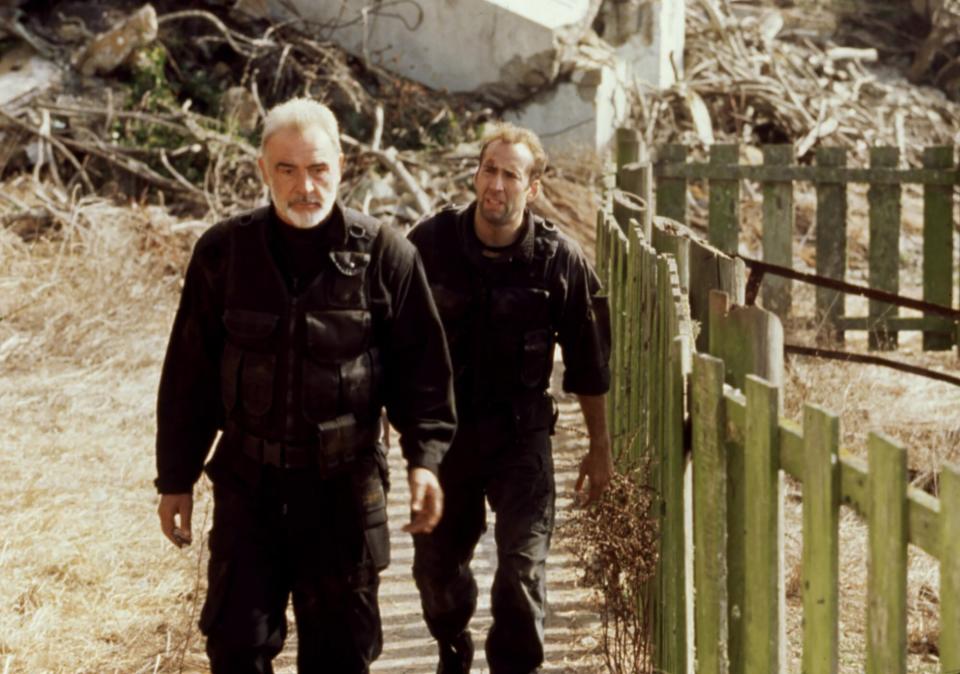
Everett Collection Sean Connery and Nicolas Cage in 'The Rock'
When I watch something like The Rock, I see Nicolas Cage just having a ball, scene after scene.
There's nothing funny written in that script. Nothing. That's all improv. And Nic didn't want to do any of that.
Really? Why not?
Nic didn't want to do it because he always thought he was a goofball and he wanted to be a serious macho man. When he came to the set, he said, "I've been working out, I want to have my arm sleeves ripped off." I'm like, "Dude, you're an FBI agent who's never used a gun. You're a chemical weapons expert." But Nic is brilliant in the movie.
Will Smith is a big part of your filmography. What went through your mind when you saw what he did at the Oscars?
At first, immediately I'm like, Did this just happen? Then I saw the yell from Will. That's a real Will yell. Will is an amazing fighter. He's studied boxing. First of all, it's wrong to do, no matter what. Let's just get that out there. But when people said, "Oh, he could have killed him." No, a slap is different. A punch? Yeah, you can kill someone. Will gave him a slap. I'm thinking, Everyone's talking about this, but you know what? You start thinking about life and it's like, Oh, my God. Because I've been very affected by this Ukrainian war right now. I'm friends with the Klitschko brothers. I've been to Kyiv, I've met with the mayor. And I'm like, you know what? There are babies getting blown up by the hundreds right now and people are so concerned about this. I don't know. To me, it's just like, enough of it. All right, so a dramatic thing happened, but I just think we've got to get our priorities straight.
Would you work again with Smith?
Absolutely, 100 percent. He's a very even-keeled guy. Very even-keeled.
We talked about Bruce Willis and his retirement. What do you want your legacy to be?
I haven't even thought about that. It's funny when I hear directors that are younger than me talk about their legacy. To me, that's sort of... I don't know. I don't think like that. I really don't. I think a day at a time, a week at a time, planning a movie. Because I'm never going to die. We're all immortal.
Ambulance is playing in theaters now.
This interview has been edited and condensed for length and clarity.
Want more movie news? Sign up for Entertainment Weekly's free newsletter to get the latest trailers, celebrity interviews, film reviews, and more.
Related content:

